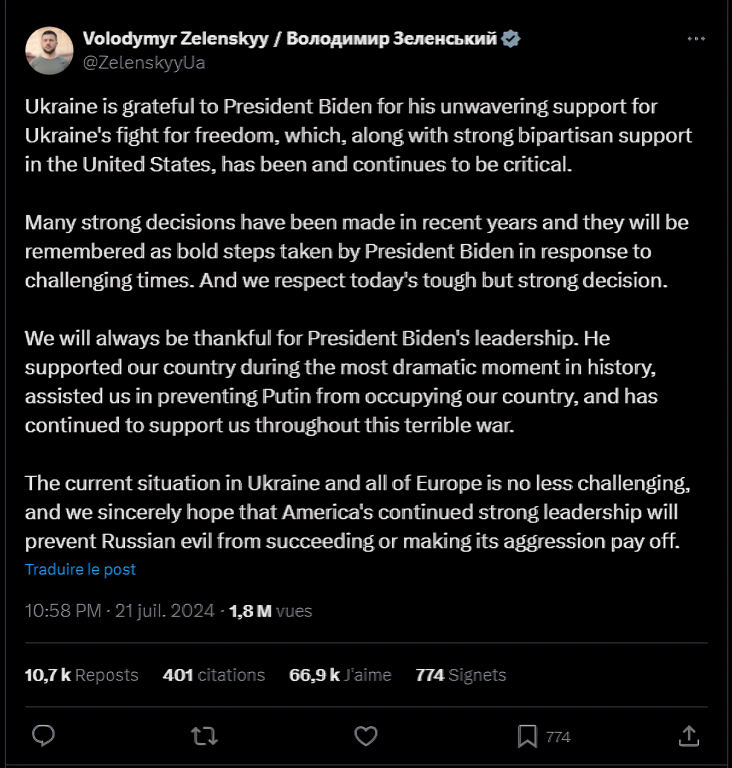Ukraine's Uncertain Future: US Presidential Race Reshapes Geopolitical Landscape
In the wake of Joe Biden's unexpected withdrawal from the US presidential race, Ukraine finds itself at a critical juncture, grappling with the potential implications for its ongoing conflict with Russia. Biden's steadfast support has been instrumental in Ukraine's defense against Russian aggression, and his departure from the race has sent ripples of concern through Kyiv's political circles.
Throughout his political career, Biden has demonstrated an unparalleled understanding of Ukraine's complexities. During his tenure as Vice President under Barack Obama, he made six visits to Kyiv and famously quipped about spending more time on the phone with then-Ukrainian President Petro Poroshenko than with his wife Jill. As President, Biden's commitment to Ukraine's cause was further cemented by his surprise visit to Kyiv in February 2023, marking the one-year anniversary of Russia's full-scale invasion.
Ukrainian President Volodymyr Zelenskyy, acknowledging Biden's pivotal role, expressed respect for the "difficult but strong decision" to exit the race. Zelenskyy emphasized Biden's unwavering support during Ukraine's "most dramatic moment in its history," underscoring the profound impact of US assistance on Ukraine's survival.

With former President Donald Trump now the frontrunner for the Republican nomination, Ukraine faces an uncertain future regarding continued US military aid and political backing. This uncertainty comes at a particularly challenging time, as Russia makes slow but steady advances on the battlefield.
Kyiv-based analyst Volodymyr Fesenko highlights the prevailing sense of ambiguity surrounding Trump's potential approach to Ukraine. While it is anticipated that Trump would initiate peace talks, the terms of such negotiations remain unclear. Fesenko speculates that Trump is unlikely to force Ukraine to recognize occupied territories as part of Russia, as such a move would be perceived as a defeat for the United States.
The Republican Party itself appears divided on Ukraine policy. Trump's running mate, JD Vance, has expressed indifference towards Ukraine and advocates for ceasing US aid altogether. In contrast, the "Reaganite" wing of the party, which often distances itself from Trump's policies, urges increased support for Ukraine.
Trump's own stance on the conflict remains ambiguous. He has boasted about his ability to swiftly end the war using his negotiation skills but has yet to present a detailed plan or name his future security team. A recent phone call between Trump and Zelenskyy was described positively by both parties, but details of the conversation remain scarce.
German analyst Nikolay Mitrokhin of the University of Bremen suggests that the Trump-Ukraine relationship is currently a "blank page." Mitrokhin posits that under a Trump administration, Ukraine might lose financial support but potentially gain access to US armored vehicles – equipment that the Biden administration has been reluctant to provide.
The Ukrainian question remains a critical issue in the US presidential race, with over half of Americans still firmly supporting aid to Kyiv. Lieutenant General Ihor Romanenko, Ukraine's former deputy chief of General Staff of Armed Forces, emphasizes the importance of swift and substantial military assistance to improve the situation on the front line, particularly in Ukraine's embattled eastern regions.
Kamala Harris, now the presumptive Democratic nominee following Biden's endorsement, may seek to boost aid to Ukraine to improve her approval ratings. However, any decisions in Washington must be "fast, energetic, and involve a large share of modern weaponry" to be effective, according to Romanenko.
Ukraine's role in US politics has been complex and, at times, controversial. Both Biden and Trump have faced scrutiny over their past dealings with Ukraine. Biden's push for the removal of Ukraine's Prosecutor General Viktor Shokin in 2016 and the subsequent allegations regarding his son Hunter's involvement with Burisma, a Ukrainian natural gas producer, have been points of contention. Trump's first impeachment in 2019 was directly linked to his actions concerning Ukraine and the withholding of aid.
As the US presidential race unfolds, Ukrainians are expressing a mix of apprehension and hope. Some, like Kateryna Kolesnik, a sales clerk in Kyiv whose brother fights on the front lines, fear that Trump might abruptly cut off aid, leaving Ukraine vulnerable. Others speculate about potential shifts in US foreign policy that could create a more challenging environment for Ukraine.
The international community's response to these developments will be crucial. As Ukraine navigates this period of geopolitical uncertainty, the support of its allies and the resilience of its people will be put to the test. The outcome of the US presidential election could significantly shape the future of the conflict and Ukraine's position on the global stage.
As this pivotal chapter in US-Ukraine relations unfolds, the world watches closely, aware that the decisions made in Washington will have far-reaching consequences not only for Ukraine but for the broader landscape of international security and diplomacy.
-
20:00
-
19:30
-
19:00
-
18:30
-
18:00
-
17:45
-
17:30
-
17:00
-
16:50
-
16:30
-
16:20
-
16:00
-
15:50
-
15:30
-
15:20
-
15:08
-
15:00
-
14:50
-
14:30
-
14:20
-
14:00
-
13:50
-
13:30
-
13:24
-
13:20
-
13:00
-
12:50
-
12:30
-
12:20
-
12:20
-
12:00
-
11:40
-
10:50
-
10:20
-
09:50
-
09:20
-
08:50
-
08:20
-
07:50
-
07:40
-
07:20
-
07:00


